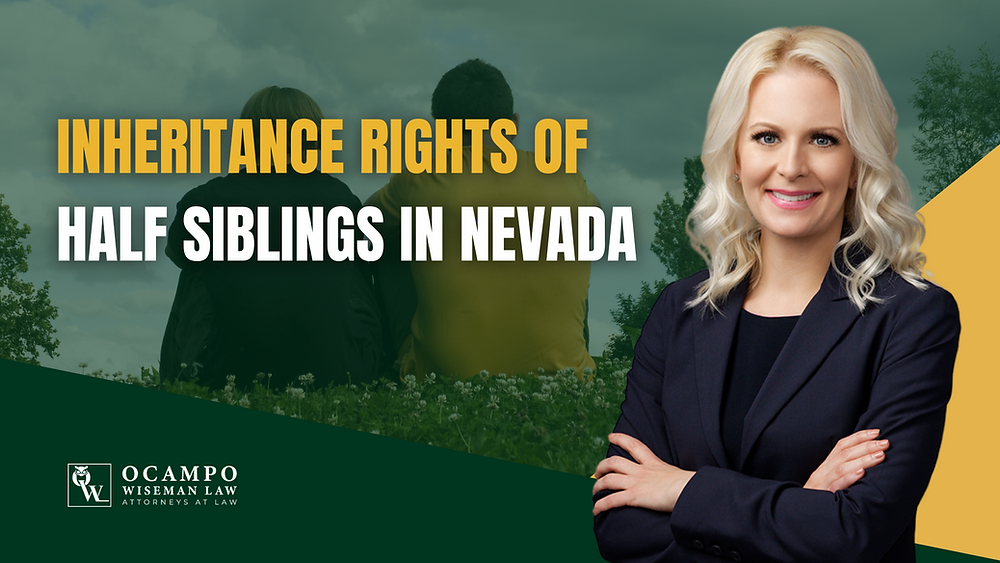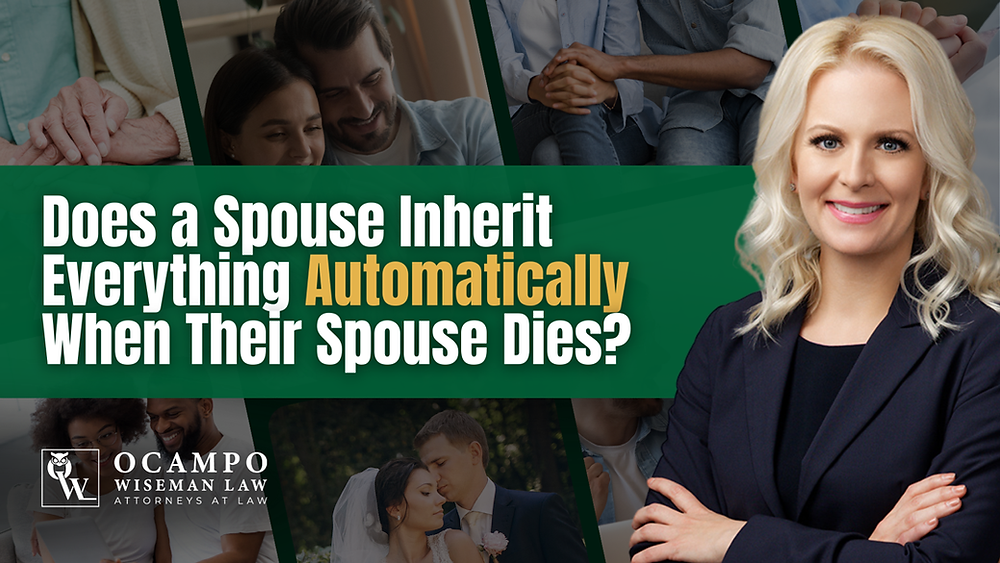Guardianship Requirements for Minor Inheritance in Nevada Probate
Sarah Ocampo
Understanding Minor Inheritance in Nevada Probate
When a loved one passes away and leaves assets to a child under 18, the probate process becomes significantly more complex. Nevada law contains specific protections for minor beneficiaries that require additional legal steps before inheritance can be transferred.
As Sarah Ocampo, probate attorney at Ocampo-Wiseman Law in Las Vegas, explains: "If it has to go through probate, then more than likely a guardianship will need to be obtained by the parent or whoever the legal guardian is of the child, or the probate court will transfer the inheritance to the child because the child is under age and they can't technically inherit right now."
This legal framework exists to protect children from potential financial exploitation and ensure their inheritance is properly managed until they reach adulthood.
Why Minor Children Cannot Directly Inherit
Legal Capacity Restrictions
Under Nevada law, minor children lack the legal capacity to directly receive and manage substantial inheritances. This restriction exists because:
- Financial Protection: Children under 18 may not have the maturity or knowledge to handle significant financial assets responsibly.
- Legal Representation: Minors cannot enter into binding contracts or make legal decisions about asset management independently.
- Court Oversight: The legal system requires adult supervision and court oversight to protect minor beneficiaries' interests.
- Fraud Prevention: Guardianship requirements help prevent exploitation of children by unscrupulous individuals who might take advantage of their inheritance.
The Technical Inheritance Barrier
As attorney Sarah Ocampo notes: "The child is underage and they can't technically inherit right now. So there needs to generally be a guardianship in place."
This "technical" barrier serves important protective purposes:
- Ensures proper asset management during the child's minority
- Provides court oversight of inheritance decisions
- Protects against financial mismanagement or exploitation
- Creates accountability for those managing the child's assets
The Guardianship Requirement Explained
Who Can Obtain Guardianship
Several parties may be eligible to obtain guardianship for inheritance purposes:
- Surviving Parent: The most common scenario involves a surviving parent obtaining guardianship to manage their child's inheritance.
- Legal Guardian: If someone is already the child's legal guardian, they can typically obtain guardianship over the inheritance as well.
- Court-Appointed Guardian: When no suitable family member is available, the probate court can appoint a guardian specifically for managing the inheritance.
- Professional Guardian: In some cases, professional guardians may be appointed to manage substantial inheritances requiring specialized financial expertise.
Types of Guardianship for Inheritance
- Guardianship of the Estate: Specifically focused on managing the child's financial assets and inheritance.
- Limited Guardianship: May be established solely for the purpose of receiving and managing the specific inheritance in question.
- Temporary Guardianship: Sometimes used during the probate process while permanent arrangements are being established.
The Legal Process: Coordinating Probate and Guardianship
Timeline Considerations
The guardianship and probate processes often must be coordinated carefully:
- Simultaneous Proceedings: As Sarah Ocampo explains, "Many times you will have to get a guardianship first or during the probate process in order for the child's inheritance to transfer appropriately."
- Sequential Steps: Sometimes, guardianship must be established before probate can proceed with distribution to the minor beneficiary.
- Court Coordination: Both proceedings may occur in the same court system, allowing for coordinated oversight and decision-making.
Required Documentation
- Guardianship Petition: Formal request to the court for appointment as guardian of the child's estate.
- Probate Documentation: Standard probate filings identifying the minor as a beneficiary and the need for guardianship.
- Financial Planning: Plans for how the inheritance will be managed and invested during the child's minority.
- Bonding Requirements: Guardians may need to post bond to protect the child's financial interests.
Protecting the Child's Financial Future
Asset Management Responsibilities
Once guardianship is established, the guardian has significant responsibilities:
- Prudent Investment: Managing inherited assets in the child's best financial interests.
- Regular Accounting: Providing detailed financial reports to the court about asset management.
- Expense Management: Using inheritance funds appropriately for the child's benefit while preserving the principal when possible.
- Record Keeping: Maintaining detailed records of all financial transactions and decisions.
Court Oversight and Protection
The probate court maintains ongoing oversight to protect the minor's interests:
- Regular Reviews: Periodic court reviews of asset management and guardian performance.
- Approval Requirements: Major financial decisions may require court approval before implementation.
- Accounting Obligations: Guardians must provide regular financial accountings to the court.
- Removal Powers: Courts can remove guardians who fail to properly manage the child's assets.
Common Scenarios and Considerations
When Both Parents Pass Away
If both parents die and leave assets to minor children:
- Extended family members may petition for guardianship
- Court appointment may be necessary if no suitable family guardian exists
- Multiple children may require coordinated guardianship arrangements
- Substantial assets might require professional guardian appointment
Blended Family Situations
When stepparents or blended families are involved:
- Legal relationships must be clearly established
- Biological vs. legal parents may have different rights
- Custody arrangements may affect guardianship decisions
- Family conflicts might require court resolution
Substantial Inheritances
Large inheritances create additional considerations:
- Professional management may be required for complex assets
- Trust structures might be more appropriate than simple guardianship
- Tax planning becomes crucial for preserving the inheritance
- Investment expertise may be necessary for proper asset growth
Alternatives to Guardianship: Trust Structures
In some cases, trust structures may provide better protection than guardianship:
- Revocable Living Trusts: Can provide for minor beneficiaries without requiring guardianship proceedings.
- Testamentary Trusts: Created through wills to manage assets for minor beneficiaries automatically.
- Special Needs Trusts: For children with disabilities who may need long-term asset protection.
- Educational Trusts: Focused specifically on funding the child's education and development.
Trust vs. Guardianship Comparison
Trusts offer several advantages:
- Less court oversight and more flexibility in management
- Professional trustee options for complex asset management
- Longer-term planning that can extend beyond age 18
Tax advantages in some situations
Guardianship may be preferable when:
- Simple asset structures don't require complex management
- Family members want direct control and court oversight
- Immediate access to funds is needed for the child's care
- Trust creation costs would be disproportionate to the inheritance size
Steps to Take When a Minor Inherits
Immediate Actions
- Consult with experienced probate counsel who understands both probate and guardianship law
- Assess the inheritance to determine if guardianship or trust structures are more appropriate
- Identify potential guardians and evaluate their suitability for managing the child's assets
- Gather necessary documentation for both probate and guardianship proceedings
Long-term Planning
- Develop asset management strategies that will benefit the child until adulthood
- Consider educational funding and other developmental needs
- Plan for the transition when the child reaches age of majority
- Establish regular review processes to ensure proper asset management
Why Expert Legal Counsel Is Essential
As Sarah Ocampo emphasizes, individual circumstances matter significantly: "Again, I'm speaking in generalities, you need to actually talk to a lawyer for your particular situation to figure out and determine what is best."
Professional legal guidance is crucial because:
- Nevada law specifics can vary based on individual circumstances
- Coordination requirements between probate and guardianship are complex
- Asset protection strategies must be tailored to each situation
- Court procedures require precise compliance with legal requirements
Questions to Discuss with Your Attorney
Asset-Specific Questions:
- What type of guardianship is most appropriate for this inheritance?
- Should we consider trust structures instead of or in addition to guardianship?
- How can we minimize court oversight while protecting the child's interests?
Process Questions:
- What is the timeline for establishing guardianship?
- How do we coordinate probate and guardianship proceedings?
- What ongoing responsibilities will the guardian have?
Planning Questions:
- How should inherited assets be invested during the child's minority?
- What expenses can be paid from the inheritance for the child's benefit?
- How do we plan for the transition when the child reaches adulthood?
Frequently Asked Questions
Q: At what age can a child directly inherit without guardianship?
A: In Nevada, children generally gain full legal capacity at age 18, though some financial institutions may require additional documentation.
Q: Can inheritance be held until the child reaches adulthood?
A: Yes, assets can be held in trust or under guardianship until the child reaches 18 or even older if structured through a trust.
Q: What happens if no one wants to serve as guardian?
A: The court can appoint a professional guardian, though this typically involves additional costs that may be paid from the inheritance.
Q: Can a minor child refuse an inheritance?
A: Minors cannot make legal decisions about inheritance acceptance or refusal - this would be handled through their guardian or court appointment.
Q: How much does guardianship cost for inheritance purposes?
A: Costs vary based on the complexity of assets and whether professional guardians are required. Simple guardianships may cost a few thousand dollars, while complex estates may require substantially more.
Taking Action: Protecting Your Child's Inheritance Rights
When a minor child is set to inherit through Nevada probate, prompt action is essential to ensure proper legal protection. The coordination of probate and guardianship proceedings requires careful planning and experienced legal guidance.
The most important step is consulting with an attorney who understands both probate and guardianship law and can evaluate your specific situation to determine the best approach for protecting your child's inheritance.
As Sarah Ocampo notes: "If you find yourself in this situation, or you want to talk more about it, I am a probate attorney in Nevada, and I am happy to talk to you."
Your Next Steps
- Don't delay - both probate and guardianship proceedings have specific timelines
- Gather documentation about the inheritance and the child's current living situation
- Identify potential guardians who could responsibly manage the child's assets
- Consult with experienced counsel who can guide you through both legal processes
- Consider long-term planning for the child's financial future and educational needs
Remember: The guardianship requirement exists to protect your child's financial interests. While it adds complexity to the probate process, proper legal guidance can ensure smooth coordination of both proceedings while safeguarding your child's inheritance for their future benefit.
Dealing with a situation where a minor child is inheriting through Nevada probate?
Sarah Ocampo at Ocampo-Wiseman Law has experience with both probate and guardianship proceedings.
Contact their Las Vegas office for a consultation about protecting your child's inheritance rights through proper legal procedures.




